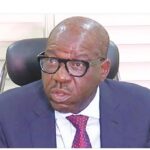Obaseki Declares Nigeria Technically Bankrupt
Obaseki Declares Nigeria Technically Bankrupt

In a bold assertion, Governor Godwin Obaseki of Edo State has declared that Nigeria is technically bankrupt, raising alarm about the country’s dire economic situation. This statement underscores the growing concerns surrounding the nation’s fiscal health and the challenges faced by its government in managing debts and resources.
Context of the Declaration
Obaseki’s declaration comes amid ongoing economic turmoil characterized by rising inflation, dwindling foreign reserves, and a significant debt burden. The governor emphasized that these factors have severely impacted the government’s ability to meet its financial obligations, leading to a precarious economic landscape for millions of Nigerians.
Economic Indicators
Recent economic indicators paint a troubling picture. Nigeria’s debt-to-GDP ratio has escalated, with the government borrowing extensively to finance its budget. Coupled with a decline in oil revenues—a critical source of income for the nation—Obaseki’s warning highlights the urgent need for a reassessment of fiscal policies and economic strategies.
Implications for Citizens
The ramifications of this declaration are profound. A technically bankrupt state may struggle to fund essential services such as healthcare, education, and infrastructure development. For ordinary citizens, this could mean reduced access to vital resources, increased unemployment, and a higher cost of living.
Calls for Action
Governor Obaseki’s comments are not merely a critique but also a call to action for both state and federal governments. He advocates for immediate economic reforms, including diversification of the economy, increased investment in agriculture, and improved revenue generation strategies. These measures are deemed essential for stabilizing the economy and ensuring sustainable growth.
Conclusion
Obaseki’s declaration serves as a wake-up call for policymakers and stakeholders across Nigeria. As the nation grapples with its financial realities, it is crucial for leadership to prioritize economic recovery and reform. Addressing these challenges will not only determine the future of Nigeria’s economy but also the welfare of its citizens. The time for decisive action is now, as the implications of inaction could be dire for the nation’s path forward.
TRENDING SONGS
 Nigerian Officials Allegedly Pocket N4–6B Weekly Through Smuggling Cartels at Seme–Badagry Border
Nigerian Officials Allegedly Pocket N4–6B Weekly Through Smuggling Cartels at Seme–Badagry Border
 Ahmad Yerima: Naval Officer to Face No Sanctions After Clash with Wike – Matawalle
Ahmad Yerima: Naval Officer to Face No Sanctions After Clash with Wike – Matawalle
 Trending Video: Muslim Man Joins Wife in Hallelujah Challenge ‘Dress Like Your Miracle’ Night
Trending Video: Muslim Man Joins Wife in Hallelujah Challenge ‘Dress Like Your Miracle’ Night
 Woman Seeks Advice as Late Brother’s Wife Refuses to Mourn Him Following His Death With Alleged Mistress
Woman Seeks Advice as Late Brother’s Wife Refuses to Mourn Him Following His Death With Alleged Mistress
 Nobody Cares About Fine Girls In The UK, I Miss Nigeria — Nigerian Lady Laments
Nobody Cares About Fine Girls In The UK, I Miss Nigeria — Nigerian Lady Laments
 Wedding Called Off: How Lady Cancels Wedding After Finding Out Finance’s Affairs With Her Bestie
Wedding Called Off: How Lady Cancels Wedding After Finding Out Finance’s Affairs With Her Bestie
 Heartbreak in Ikeja: Lady Weeps After Fufu Found in New Phone Package
Heartbreak in Ikeja: Lady Weeps After Fufu Found in New Phone Package
 Twist of Fate: Man Who Questioned Phyna’s ₦1Billion Demand Mourns Brother in Dangote Truck Crash
Twist of Fate: Man Who Questioned Phyna’s ₦1Billion Demand Mourns Brother in Dangote Truck Crash
 Tragedy in Enugu: Dangote Truck Claims Lives of Family of Five
Tragedy in Enugu: Dangote Truck Claims Lives of Family of Five
 Bangkok Crackdown: Nigerian-Thai Couple in Police Net Over Drug Trafficking
Bangkok Crackdown: Nigerian-Thai Couple in Police Net Over Drug Trafficking
Share this post with your friends on ![]()













